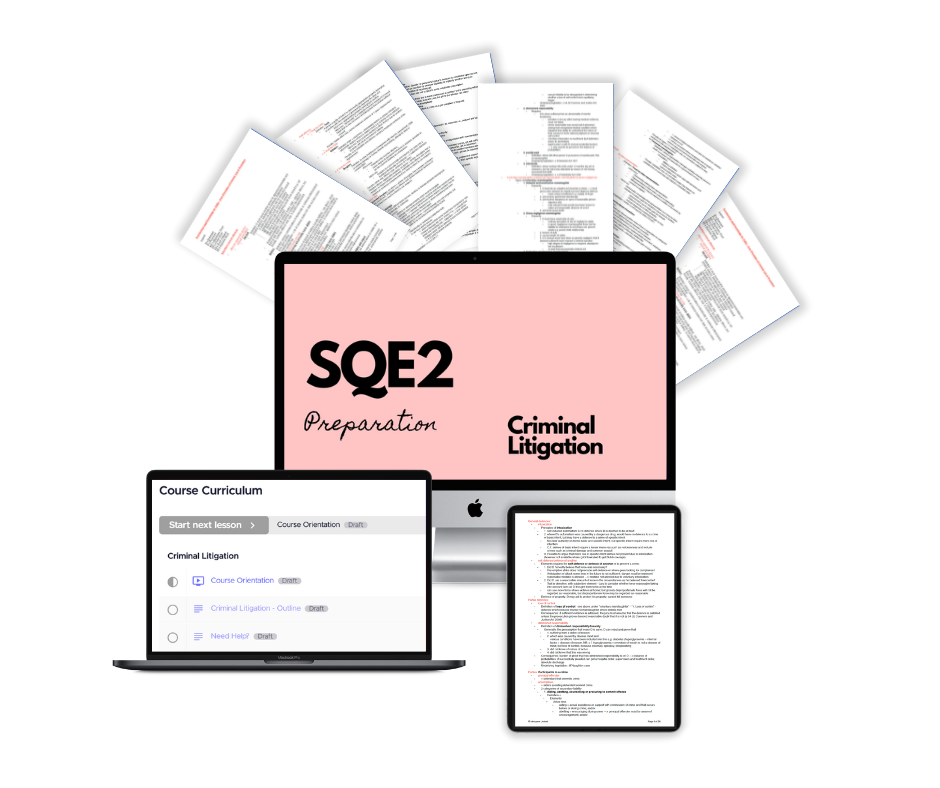
SQE2 Preparation - Criminal Litigation
Looking for concise, yet comprehensive materials to prepare for the SQE2 assessments in Criminal Litigation?
Then, you are in the
SQE2 Preparation - Criminal Litigation
contains:
Byte sized videos explaining substantive law and procedures
Outlines covering the SRA FLK in Criminal Litigation
1 mock exam per assessment type (5 mock exams in total) including suggested solutions
See what the course looks like inside
Why SQE2 Preparation - Criminal Litigation?
Efficient and subject-matter focused revision
Created by someone who passed the SQE2 first time
Sit the exam with confidence
What do the SQE2 Preparation - Criminal Litigation video lectures cover?
The videos contain byte-sized overviews of the functioning legal knowledge specified by the SRA in relation to
- Core knowledge areas of criminal law,
- Advising clients about the procedures and processes at the police station,
- the procedures and processes involved in criminal litigation.
What does the Criminal Litigation outline cover?
The outlines contain the entire functioning knowledge specified by the SRA in relation to Criminal Litigations for the SQE2.
What is included in the mock exams?
You will receive access to the following mock exams (including suggested solutions):
1x Criminal Litigation - Case & Matter Analysis
1x Criminal Litigation - Research Assessment
1x Criminal Litigation - Writing Assessment
1x Criminal Litigation - Drafting Assessment
1x Criminal Litigation - Advocacy
What is the SQE2?
The SQE2 exam is the second of two "super" exams required by the Solicitors Regulation Authority in order to qualify as a solicitor of England and Wales.
The SQE2 exam contains the following assessments:
- Written Part
- Day 1 - Dispute Resolution and Criminal Procedure
- Day 2 - Property and Wills
- Day 3 - Business Law
- Oral Part
-
- Day 1 - Dispute Resolution and Property
- Day 2 - Criminal Procedure and Wills
Each day of the written part includes:
- Case & Matter Analysis (60min)
- Legal Writing (30min)
- Legal Research (60min)
- Legal Drafting (45min)
Each day of the oral part includes:
- Advocacy (45min prep and 15min presentation)
- Client Interviewing (10min prep, 25min interviewing, and 25min writing an attendance note by hand)
Who will teach me?

Hi there
My name is Madeleine Weber!
I have been working as a legal professional for half a decade, predominantly in the IT industry as an in-house counsel in the UK.
I qualified as a solicitor via the transitional arrangements by sitting the QLTS MCT and the SQE2.
I passed the first ever SQE2 exam on my first attempt in 2022.
Whilst preparing for the exam, I really wished I had concise and focused revision materials that contained everything I needed to know.
That is what inspired me to create easy to follow resources and notes based on the Functioning Legal Knowledge required by the SRA.
What past students have said:
Dimuthu Munaweera, SQE2 Preparation - Advantage Package Student:

"I must say, your course outlines and the vids have been a game-changer for my preparation journey. The explanatory videos are incredibly helpful, and your method of breaking down the law with clear, well-designed slides is exceptional. I appreciate how you highlight the key areas we need to study by heart, making the learning process much more efficient.
I particularly love the user-friendly portal, and the personal note feature in your videos adding a unique touch that makes the learning experience more personalized. In addition to your videos, I also love the outlines - they focus on what truly matters, sparing us from the overwhelming bulkiness of SQE prep books. In essence, they provide a concise and focused guide to what we need to know , and the fact that they come from someone who has successfully passed the SQE 2 is quite reassuring."
Tarnjeet Singh, SQE2 Mock Exams & Personalised Feedback Student:
"I found the SQE mocks really helpful! They reflected both the format and difficulty of the real exams. Maddie’s feedback helped me approach the exams more confidently and was very practical. She also took the time to discuss any other concerns I had throughout my prep."
Disheta Shah, SQE2 Preparation - Advantage Plus Student:
"Your SQE2 advantage prep course has to be the most resourceful course I’ve taken part in, having done the SQE2 and retaking them, your course outlines, content, mock prep and one to one sessions with you are more than what the university course could provide. If I had to do the whole process again, I wouldn’t bat an eyelid to pay for a course with you compared to ULaw! Whilst they’re still stuck in the LLB teaching methods, you really enabled me to feel so much more confident in my exams. I loved your structure and your tips for the oral exams which I will definitely be using going forward in my career regardless of the outcome of the exams!"
Mushira Arshad, SQE2 Mock Exams, Personalised Feedback & Outlines Student:
"I only learnt about Madeleine's prep materials 2 months before the exams, but Madeleine's promptness made the process smooth. Her materials are reasonably priced, and if I dare say, it's a steal for the level of detailed feedback she provides. I took the advantage pack and found that the mocks and answers were brilliant and thorough. Also the feedback given by Madeleine was detailed and helped me zero in and improve my weak areas. If you're looking for personalised attention during your prep for SQE2, inhouseW is it. She is flexible in adjusting the prep course according to an individual's requirements. For example, I asked for 5 personalised feedback assessments and she made it possible. I also had access to the outlines for all the subjects, and they were perfect for last-minute revision before the exams. In fact, the outlines were the only material I firmly held onto during the exam period and the month prior. She has managed to perfectly sum up the knowledge in line with the SRA FLK specifications for SQE2. I firmly recommend her to future SQE2 exam takers."
Ruth, SQE2 Preparation - Advantage Plus Student:
"The resources have been really helpful. I used the outlines as an addition to the main Barbri materials and I liked the fact that it got straight to the point and followed the SRA SQE2 FLK structure. The mock exams were particularly useful as it was in a similar format, writing style and difficulty level which was akin to the real thing. The mock solutions were detailed and really helped with my revision in terms of understanding how to apply the law to the scenario given."
FAQ
This is a very subjective question and will depend on your background and education.
I personally would recommend to purchase a SQE2 preparation course, as this will provide you with all the tools to have the best chance to pass on your first attempt.
My SQE2 resources should be relied on as supplementary revision aides.
You will have access for 1 year from the date of purchase.
Byte-sized videos (between 2-10min long each) explaining the substantive law and procedure.
1x outline covering all the topics listed by the SRA in relation to criminal litigation.
5x mock exams (1x/assessment type).
No, they are the same. If you have already purchased the outline/mock exam/advantage package(s) and wish to buy the videos, please contact me directly at madeleine@inhousew.com or via DM on Instagram to receive a coupon code to reflect the purchase you already made.
All materials are downloadable and usable offline.
The course is provided via Teachable. All materials will be available on all your devices either via a web browser or via the Teachable app.
If you are unhappy about any aspect of the course, do let me know and I will do my best to sort the issue out for you.
Otherwise, there is no refund policy for this product.




